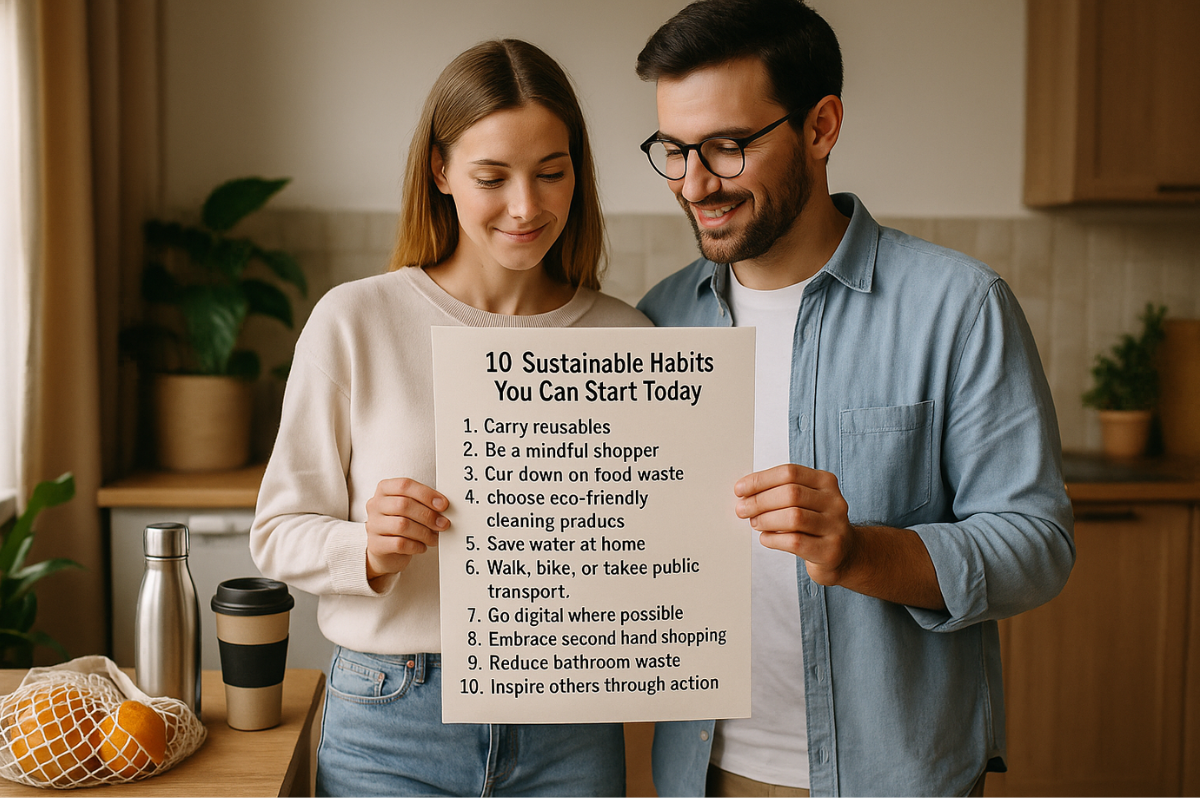Adopting sustainable habits doesn’t require radical life changes. The most impactful steps often come from small, everyday choices that gradually become second nature. This guide brings you 10 simple yet powerful habits you can start today to live a more eco-conscious life—without spending a lot or sacrificing comfort.
1. Carry Reusables Wherever You Go
One of the easiest ways to reduce your environmental footprint is by keeping reusable items in your daily bag. These can include:
- A stainless steel water bottle
- A reusable coffee cup
- Bamboo or metal utensils
- A cloth shopping bag
Having them on hand reduces your need for single-use plastics and keeps waste out of landfills.
2. Be a Mindful Shopper
Buy only what you truly need. Every product we purchase uses resources to be made, packaged, and shipped. Before buying, ask yourself:
- Do I already own something similar?
- Can I borrow or buy second-hand?
- Is this item built to last?
Minimalist consumption is one of the most powerful sustainability habits you can adopt.
3. Cut Down on Food Waste
Food waste is not just about tossing leftovers—it also means wasting all the energy and water used to produce, transport, and store that food.
What You Can Do:
- Plan weekly meals
- Use grocery lists
- Cook with what’s already in your fridge
- Freeze extras instead of throwing them away
- Compost food scraps if possible
4. Choose Eco-Friendly Cleaning Products
Many household cleaners are filled with chemicals that pollute water systems and come in single-use plastic containers.
Sustainable Swaps:
- Make your own cleaner with vinegar, lemon, and baking soda
- Use glass spray bottles or refillable containers
- Choose brands that use biodegradable formulas and packaging
5. Save Water at Home
Water conservation is easy when built into your routine.
Smart Practices:
- Turn off the tap while brushing your teeth
- Install a low-flow showerhead
- Collect rainwater for plants
- Wash only full loads of laundry or dishes
- Fix leaks as soon as possible
These simple steps can save thousands of liters per year.
6. Walk, Bike, or Take Public Transport
Transportation is one of the largest contributors to greenhouse gas emissions. Reducing car use not only benefits the environment but also your physical and mental health.
Ways to Cut Emissions:
- Walk or bike for short trips
- Use public transport when available
- Carpool to work or events
- Combine errands to reduce driving time
7. Go Digital Where Possible
Paper bills, printed receipts, and physical magazines all create waste.
How to Digitize:
- Sign up for online statements
- Say no to printed receipts
- Read books, news, and magazines on your devices
- Use apps for to-do lists and notes
It’s a small switch that leads to long-term savings of paper and energy.
8. Embrace Second-Hand Shopping
Buying second-hand keeps items in use longer and diverts waste from landfills.
Great Second-Hand Finds:
- Clothing and shoes
- Furniture and home décor
- Tools and electronics
- Books, toys, and kitchenware
Thrift stores, community groups, and online platforms make second-hand shopping easy and affordable.
9. Reduce Bathroom Waste
The bathroom is often filled with unnecessary plastics and chemicals.
Sustainable Alternatives:
- Use bar soap and shampoo bars
- Try toothpaste tablets and bamboo toothbrushes
- Ditch disposable razors for safety razors
- Use washable cloths instead of makeup wipes
A few swaps can drastically cut plastic waste in your bathroom.
10. Inspire Others Through Action
The more people practicing sustainability, the greater the collective impact. You don’t have to lecture—just live by example.
How to Encourage Others:
- Share your habits and experiences online
- Gift sustainable products
- Host clothing swaps or eco-friendly gatherings
- Talk about your choices openly but kindly
Awareness spreads through action, not judgment.
A Greener Lifestyle Is Within Reach
These 10 habits are simple, realistic, and inexpensive. The goal isn’t perfection—it’s consistency. The more these practices become part of your daily life, the easier they become. And together, they contribute to a meaningful shift toward a healthier planet.
Start with one or two habits and build from there. Every action matters—especially when multiplied by millions.
